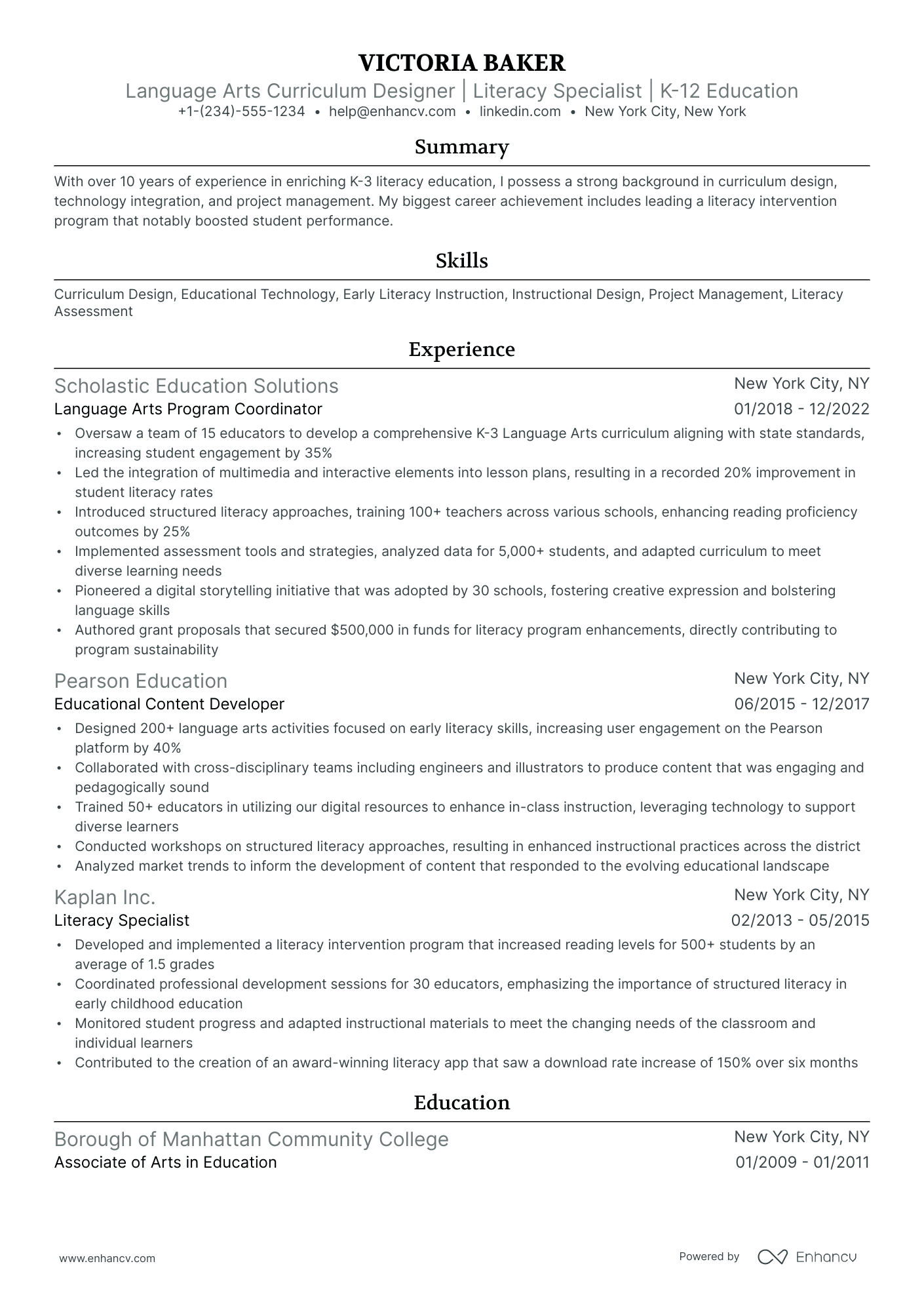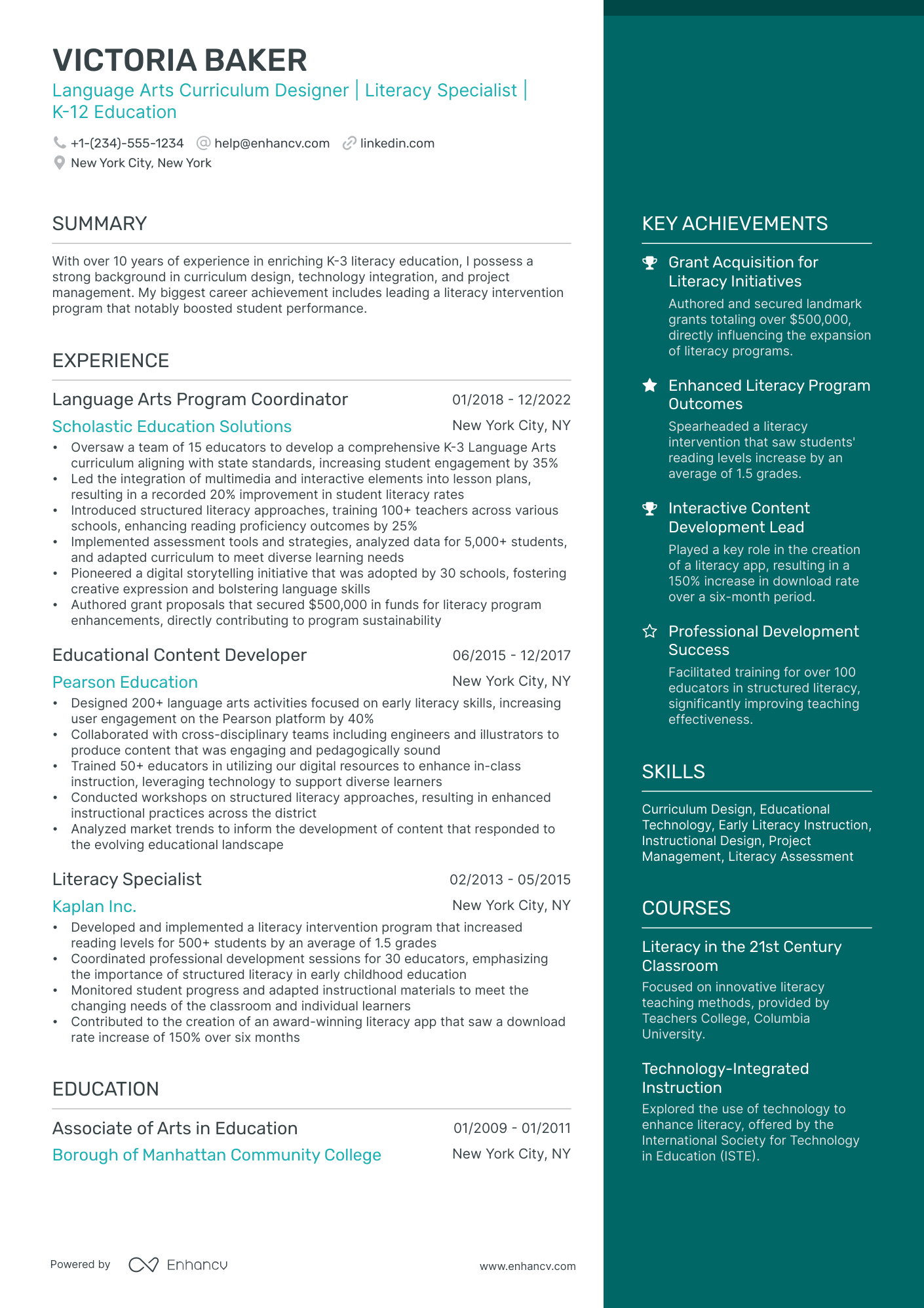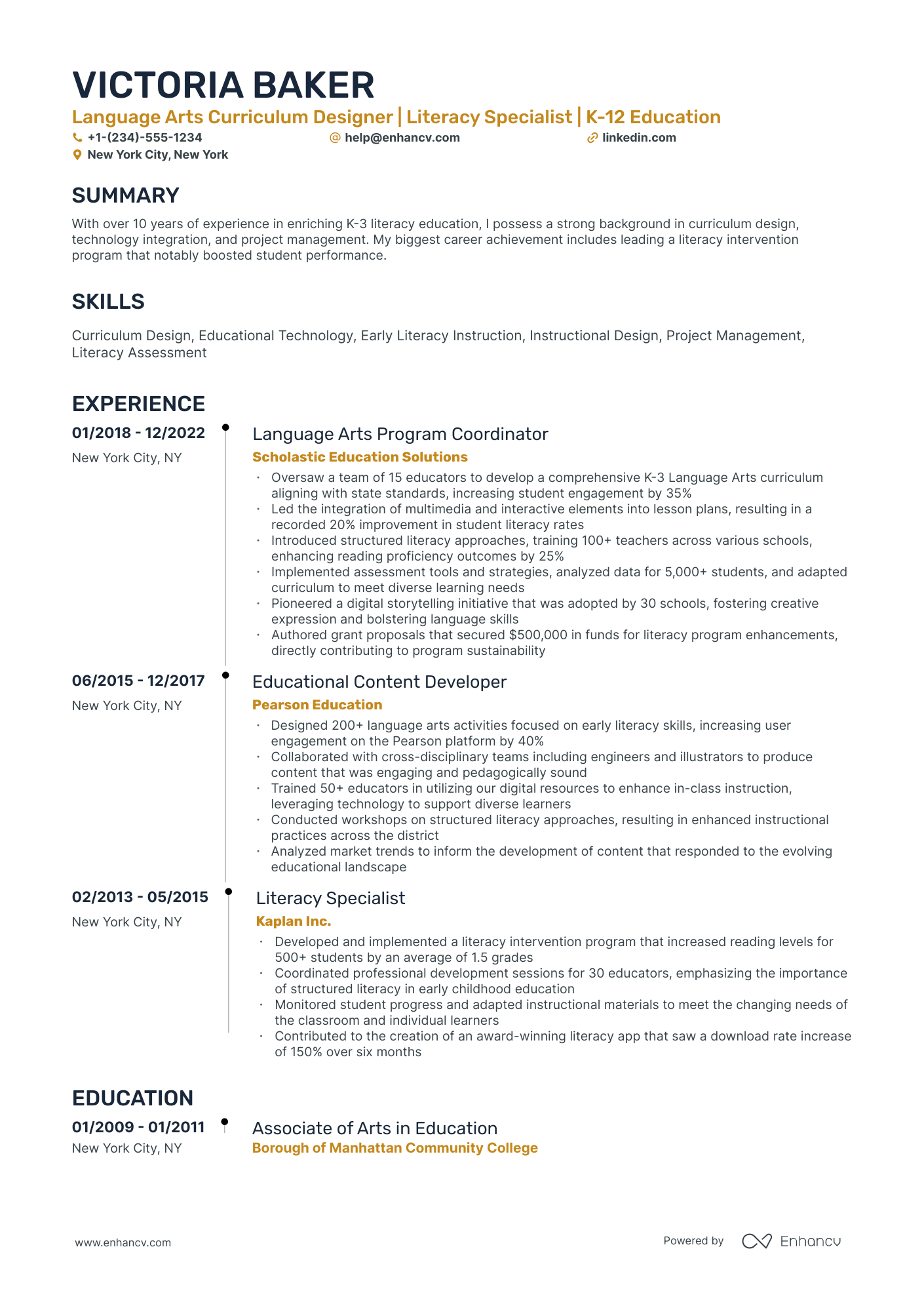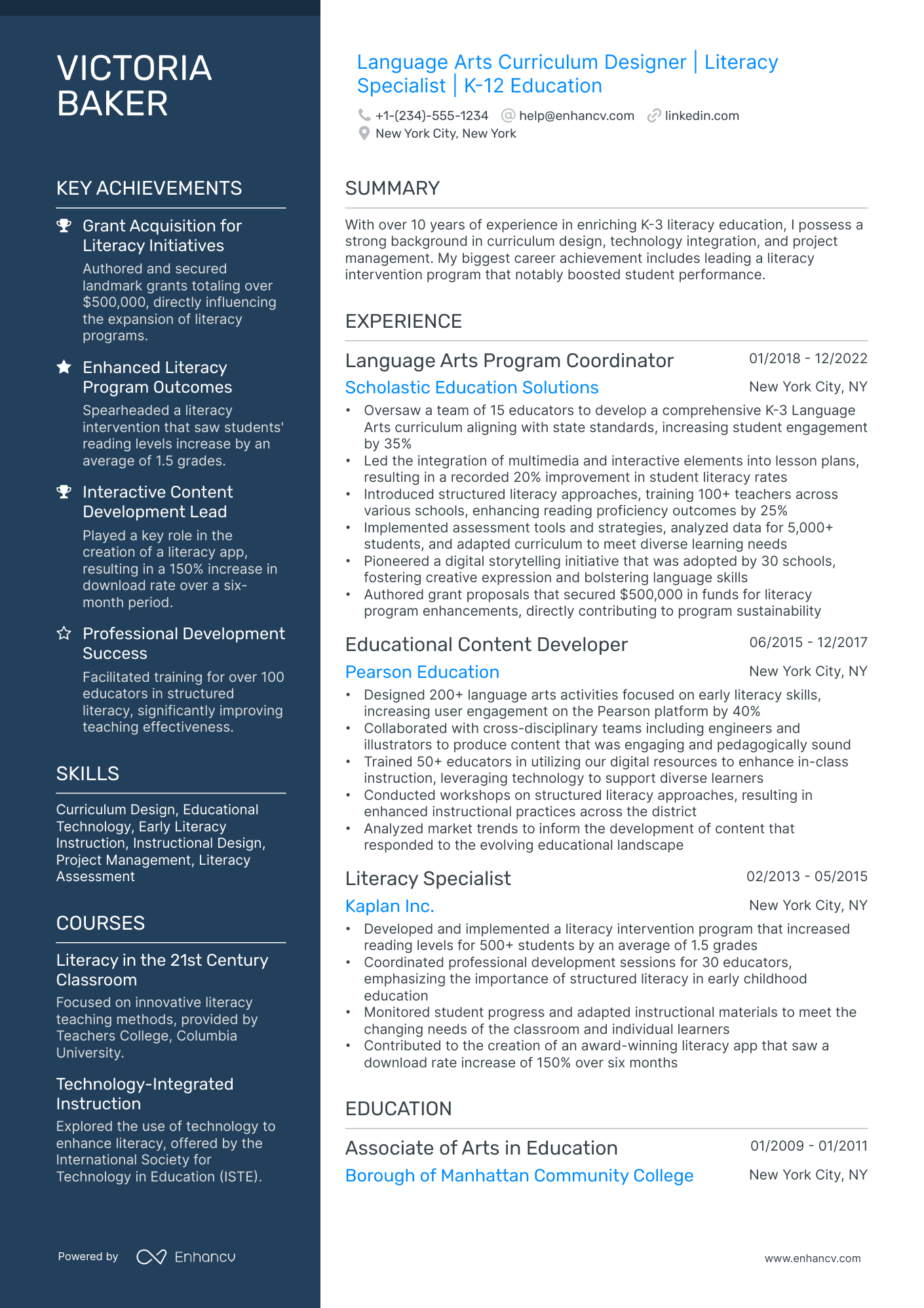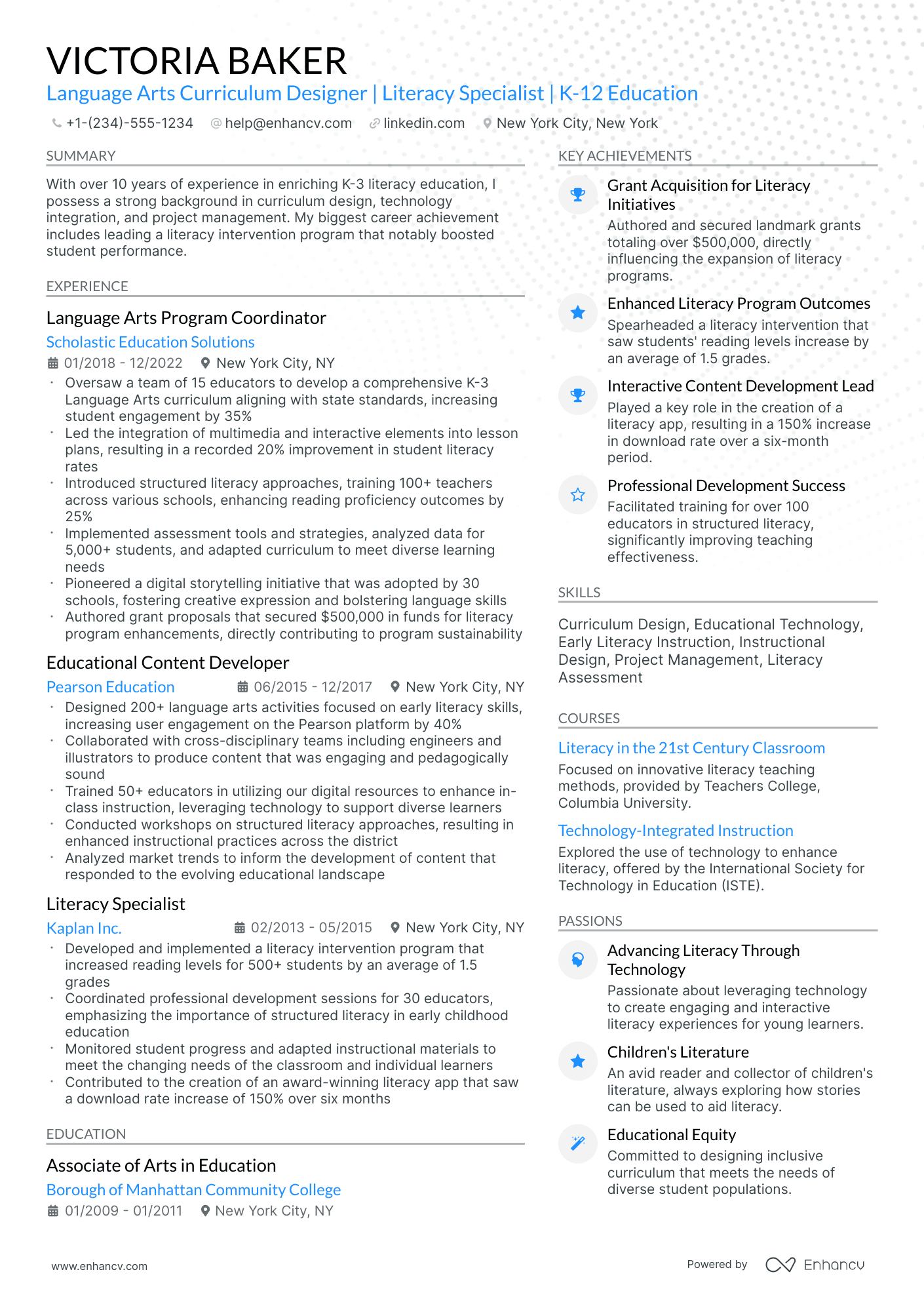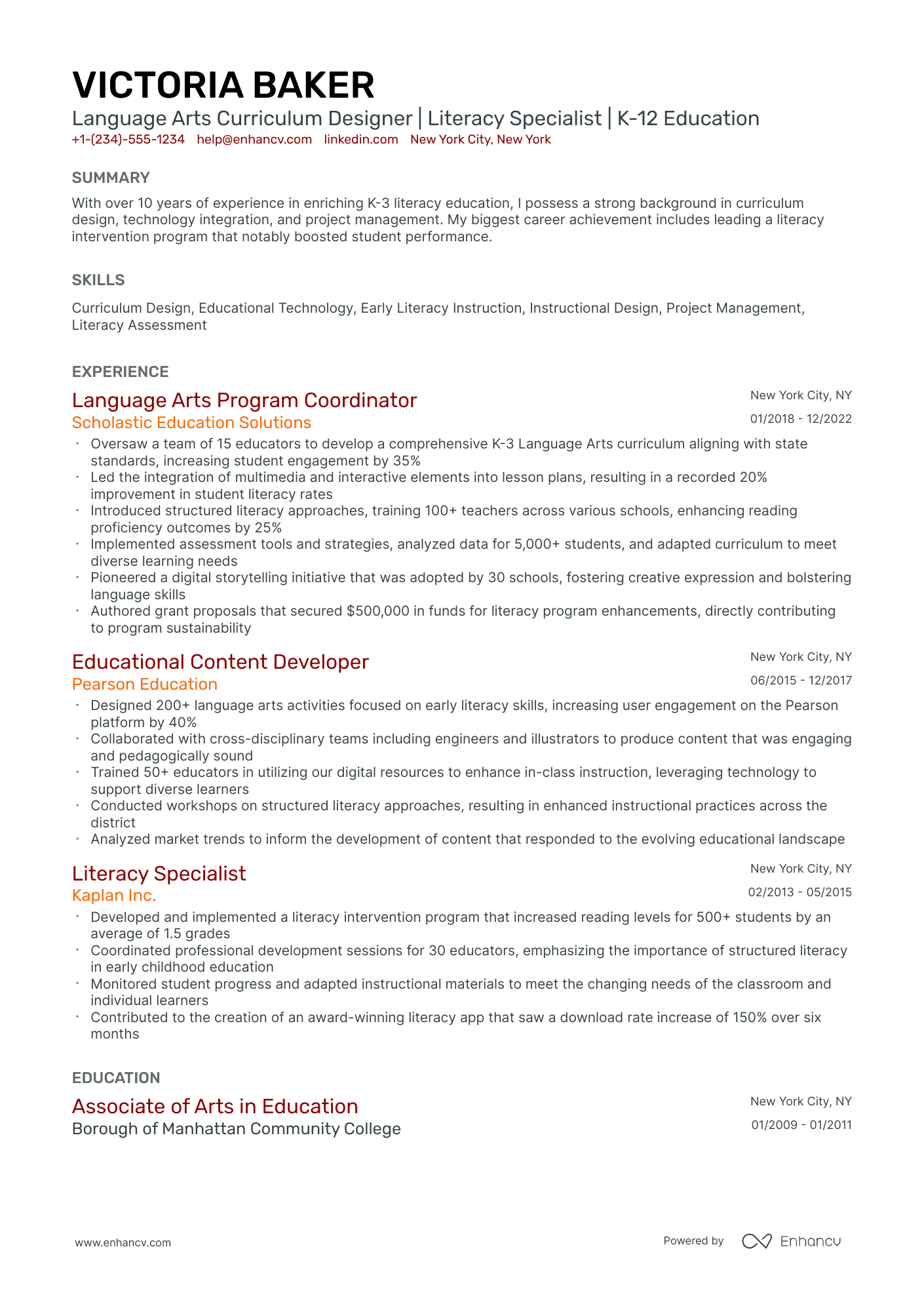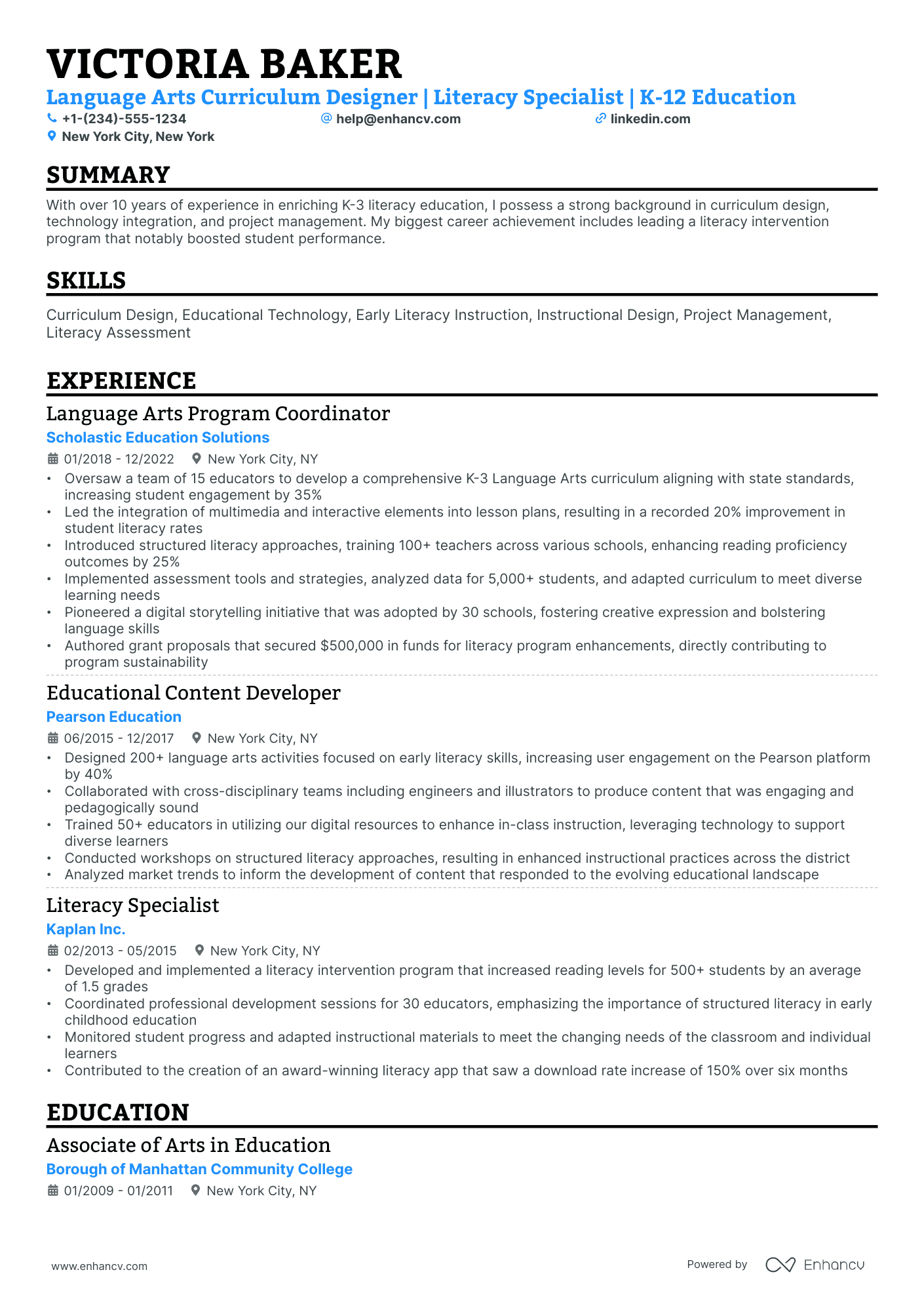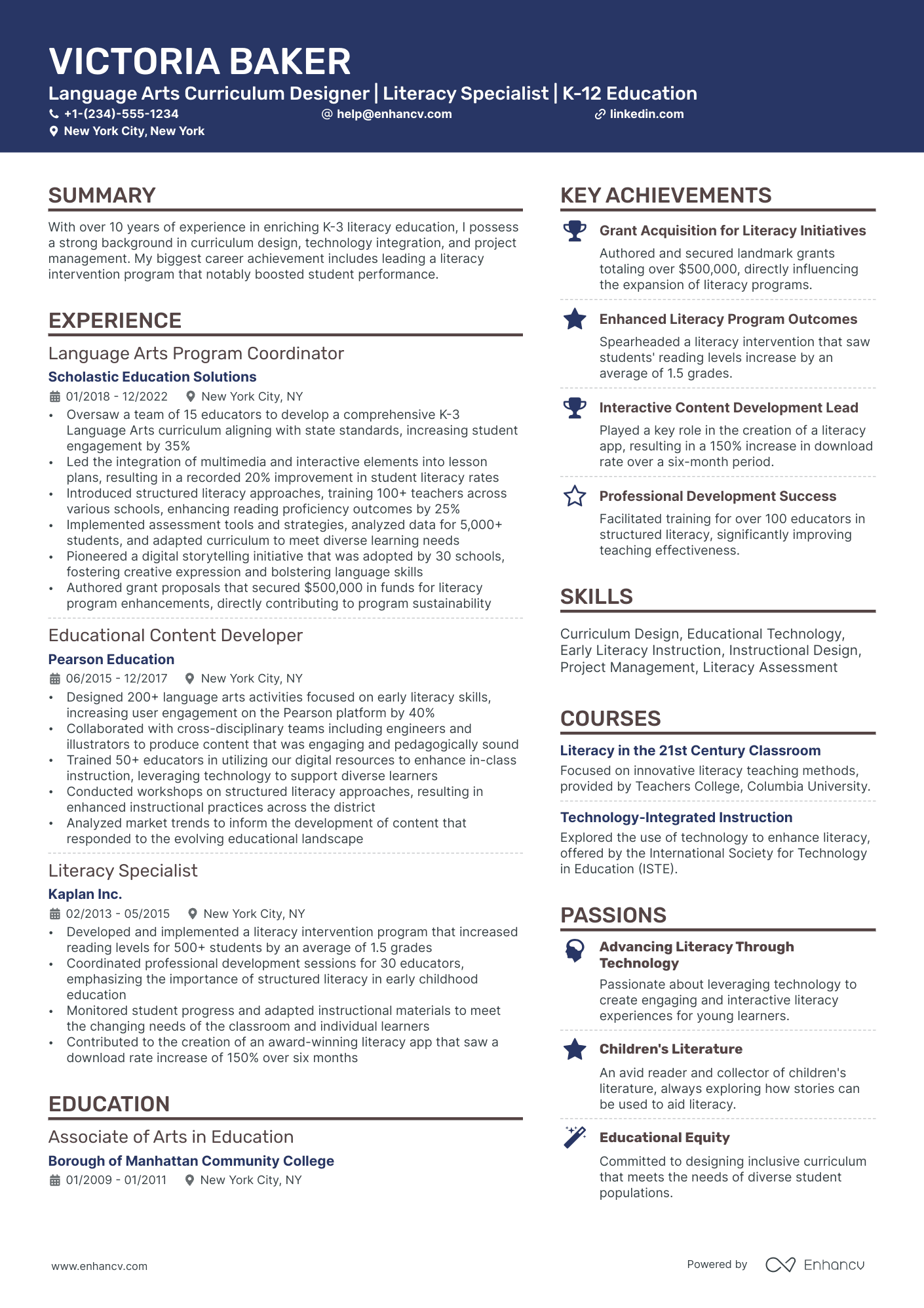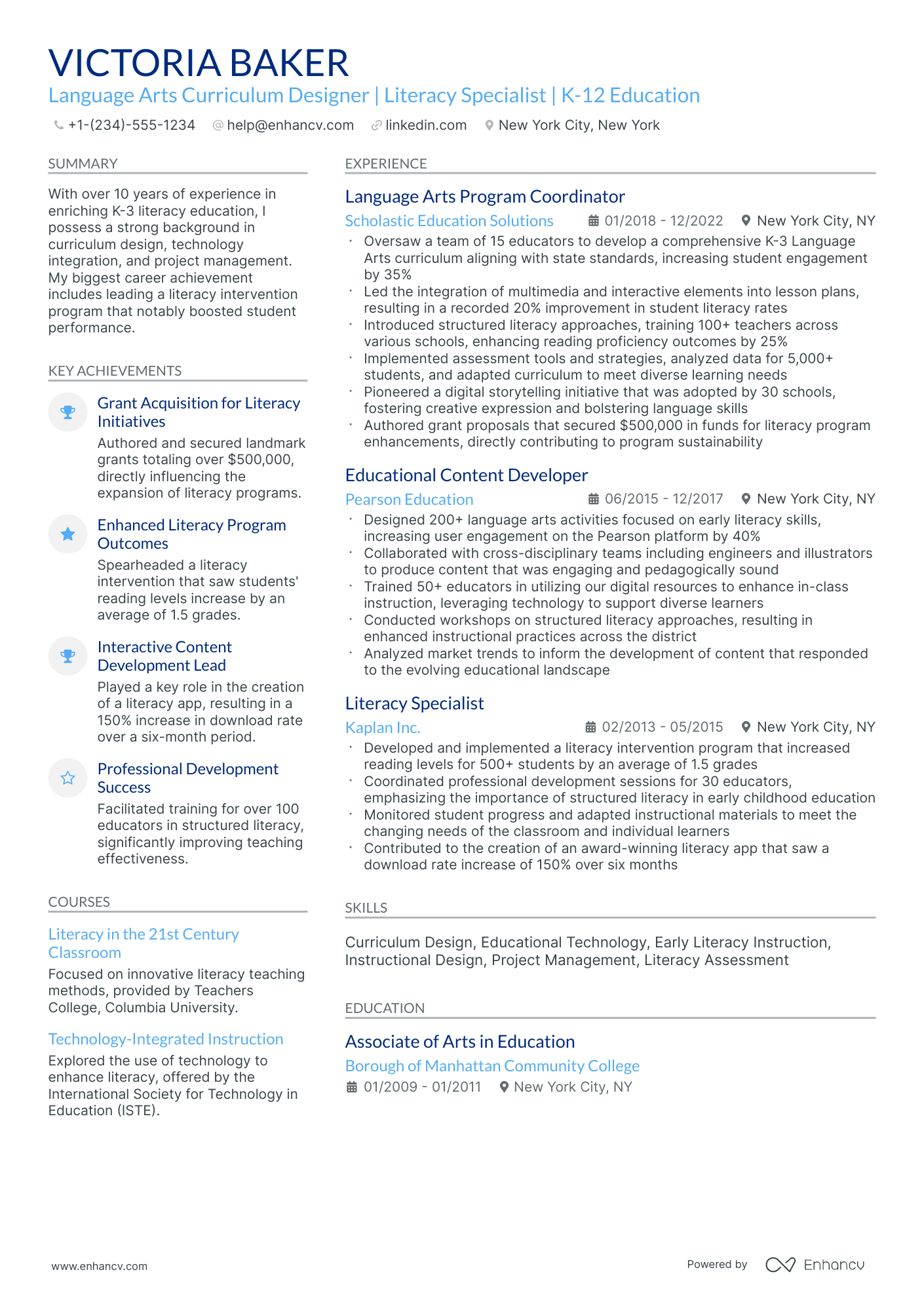As a curriculum designer, effectively showcasing your ability to create engaging educational content can be a challenging task for your resume. Luckily, our guide is here to help you distill complex projects into succinct, impactful bullet points that will capture the attention of prospective employers.
- Apply best practices from professional resumes to spotlight your application;
- Quantify your professional experience with achievements, career highlights, projects, and more;
- Write an eye-catching curriculum designer resume top one-third with your header, summary/objective, and skills section;
- Fill in the gaps of your experience with extracurricular, education, and more vital resume sections.
We've selected, especially for you, some of our most relevant curriculum designer resume guides. Getting you from thinking about your next career move to landing your dream job.
Optimize your curriculum designer resume format to pass the recruiters' assessment
You may be wondering just how much time you need to spend on designing your curriculum designer resume.
What recruiters are looking for is systematised content that is clear and coherent. Thus, your curriculum designer resume needs to answer requirements and why you're the best candidate for the role from the get-go.
Often, a clear layout consists of:
- Sorting your experience in the reverse chronological order - starting with your most recent and relevant roles. This is an excellent choice for more experienced professionals;
- Writing your contact information (e.g. personal phone number and email address) and your portfolio or LinkedIn link in your curriculum designer resume header. If you're wondering to include a photo or not, always make sure that it's appropriate for the country you're applying in;
- Use the basic, most important curriculum designer resume sections - your experience, education, summary, etc. Use your resume's real estate wisely to tell a compelling, professional story and match job description's keywords;
- Don't go overboard with the length of your resume. One page is absolutely fine if you happen to have under a decade of relevant experience.
Are you still wondering if you should submit your curriculum designer resume in PDF or Word format ? The PDF has a few more advantages, as it doesn't change the format and the text can't be altered upon application.
Format matters most when your curriculum designer resume is assessed by the Applicant Tracker System (or the ATS).
The ATS parses resumes, looking for specific keywords, skills or experience that match the job description.
P.S. We recently did a study on how the ATS works and were able to demystify three of the biggest misconceptions about how it assesses candidate resumes.
To pass the ATS evaluation, select any of the serif or sans-serif fonts. Popular choices that would help your curriculum designer resume stand out include Raleway, Exo 2, Montserrat, etc.
Most traditionalists go for Arial or Times New Roman, but it's often the case that many candidates choose these fonts, and you'd thus lose points on the uniqueness front.
Align your resume with the market’s standards – Canadian resumes may have unique layout guidelines.
Upload & Check Your Resume
Drop your resume here or choose a file. PDF & DOCX only. Max 2MB file size.
PRO TIP
Bold the names of educational institutions and certifying bodies for emphasis.
The six in-demand sections for your curriculum designer resume:
- Top one-third should be filled with a header, listing your contact details, and with a summary or objective, briefly highlighting your professional accolades
- Experience section, detailing how particular jobs have helped your professional growth
- Notable achievements that tie in your hard or soft skills with tangible outcomes
- Popular industry certificates to further highlight your technical knowledge or people capabilities
- Education to showcase your academic background in the field
What recruiters want to see on your resume:
- Demonstrated experience in curriculum development and instructional design, including familiarity with various educational models and theories.
- Proficiency in curriculum evaluation and assessment, with examples of how previous curricula have met educational standards and improved learning outcomes.
- Ability to integrate technology and digital tools into the curriculum, showcasing skills in e-learning and digital content creation.
- Experience with cross-disciplinary and culturally responsive curriculum design to cater to diverse learning needs and environments.
- Strong project management skills, with evidence of leading curriculum development projects and collaborating with educators, subject matter experts, and stakeholders.
What is the resume experience section and how to write one for your past roles
The experience section in a curriculum designer resume is critical for your profile and overall application. It should not only display your work history, but also highlight your achievements in previous roles.
Many candidates either simply list their duties or provide excessive details about past, irrelevant jobs. A more effective approach involves first examining the job advertisement for keywords - specifically, skills essential for the role. Then, demonstrate these key requirements throughout different parts of your resume, using accomplishments from your roles.
Format each bullet point in your experience section by starting with a strong action verb. Follow this with a description of your role and its impact on the team or organization.
Aim to include three to five bullet points for each role.
Finally, gain insights into how professionals have crafted their curriculum designer resume experience sections by exploring some best practice examples.
- Led a team of curriculum specialists in the design and development of an interdisciplinary STEM curriculum for grades K-12, leading to a 35% increase in student engagement.
- Pioneered the use of virtual reality technology to create immersive learning experiences, enhancing student comprehension by 40% as measured by pre- and post-assessments.
- Collaborated with industry experts to integrate real-world problem-solving into the curriculum, which increased the rate of post-graduation job placements by 25%.
- Authored a comprehensive digital literacy curriculum adopted by over 200 schools nationwide, resulting in a 30% rise in students' digital competency scores.
- Implemented a train-the-trainer program for instructional staff that decreased time-to-implementation of new curricula by 50%.
- Coordinated with cross-functional teams to ensure the alignment of curriculum with state standards and testing requirements, influencing a 20% improvement in state test scores.
- Developed an asynchronous e-learning strategy for adult learners, which improved course completion rates by 45% within two years.
- Led the successful accreditation process of online courses, enabling a 60% increase in enrollment due to expanded credential recognition.
- Managed the integration of adaptive learning technologies that personalized student education paths, resulting in a 25% boost in overall course satisfaction.
- Redesigned a corporate training program for a Fortune 500 company that slashed onboarding time by 30% and cut training costs by 20%.
- Implemented a competency-based educational model for a suite of courses, which saw a 40% increase in learner performance metrics.
- Advised on the adoption of mobile learning solutions that contributed to a company-wide increase in continuous learning participation by 50%.
- Formulated a language arts curriculum that improved average reading comprehension scores by 22% across participating middle schools.
- Developed educator professional development workshops, directly contributing to a 15% rise in teacher satisfaction scores.
- Orchestrated a community input initiative to ensure curriculum relevance, which enhanced community partnerships with local businesses by 30%.
- Contributed to a team responsible for a 20% increase in user retention through innovative, learner-centered design approaches.
- Assisted in conducting educational research to inform the creation of interactive digital textbooks, which saw a high adoption rate of 85% in pilot schools.
- Supported the revision of science curriculums in line with Next Generation Science Standards, enhancing preparatory compliance by 30% ahead of state adoption.
- Co-developed an award-winning financial literacy curriculum that was rolled out to over 500 high schools, positively impacting over 100,000 students' financial awareness.
- Spearheaded a professional development series for educators on utilizing technology in the classroom, growing digital implementation by 65%.
- Led a curriculum pilot program that became the benchmark for district-wide adoption, reducing the need for external resources by 75%.
- Initiated a data-driven curriculum redesign that catered to diverse learning styles, leading to a 33% improvement in user engagement metrics.
- Integrated gamification elements into the learning management system that increased course completion rates by 50% within one fiscal year.
- Facilitated international collaborative projects that resulted in consistently high-quality curriculum content, earning the program global recognition in innovation in education.
The following content includes information from "O*NET OnLine" by the U.S. Department of Labor, Employment and Training Administration (USDOL/ETA). Used under the CC BY 4.0 license. The data represents the top responsibilities present on the task lists for curriculum designer professionals.
Top Responsibilities for Curriculum Designer:
- Observe work of teaching staff to evaluate performance and to recommend changes that could strengthen teaching skills.
- Plan and conduct teacher training programs and conferences dealing with new classroom procedures, instructional materials and equipment, and teaching aids.
- Interpret and enforce provisions of state education codes and rules and regulations of state education boards.
- Conduct or participate in workshops, committees, and conferences designed to promote the intellectual, social, and physical welfare of students.
- Advise teaching and administrative staff in curriculum development, use of materials and equipment, and implementation of state and federal programs and procedures.
- Advise and teach students.
- Recommend, order, or authorize purchase of instructional materials, supplies, equipment, and visual aids designed to meet student educational needs and district standards.
- Update the content of educational programs to ensure that students are being trained with equipment and processes that are technologically current.
- Address public audiences to explain program objectives and to elicit support.
- Research, evaluate, and prepare recommendations on curricula, instructional methods, and materials for school systems.
Quantifying impact on your resume
- Specify the total number of curriculum projects completed, demonstrating your capacity for workload and project management.
- Include the percentage of content you updated or developed, reflecting your contribution to the material’s relevance and modernity.
- Highlight the exact number of educational institutions or departments that have adopted your curriculum, showcasing your work's reach and adoption rate.
- Mention quantifiable improvements in student outcomes or performance due to your curriculum, illustrating the effectiveness of your educational designs.
- Note the scale of collaboration by detailing the number of interdisciplinary teams or subject matter experts you worked with, indicating teamwork and networking abilities.
- Showcase the reduction in training time or costs due to your curriculum development, showing a direct link to operational efficiency.
- Indicate the number of courses or modules you have created or converted into eLearning, highlighting your adaptability to digital learning trends.
- Present any awards, grants, or recognitions received in numeric terms, to emphasize prestige and validation of your work.
Action verbs for your curriculum designer resume
Writing your curriculum designer experience section without any real-world experience
Professionals, lacking experience, here's how to kick-start your curriculum designer career:
- Substitute experience with relevant knowledge and skills, vital for the curriculum designer role
- Highlight any relevant certifications and education - to showcase that you have the relevant technical training for the job
- Definitely include a professional portfolio of your work so far that could include university projects or ones you've done in your free time
- Have a big focus on your transferable skills to answer what further value you'd bring about as a candidate for the curriculum designer job
- Include an objective to highlight how you see your professional growth, as part of the company
Recommended reads:
PRO TIP
The more time and effort you've put into obtaining the relevant certificate, the closer to the top it should be listed. This is especially important for more senior roles and if the company you're applying for is more forward-facing.
The right balance between hard skills and soft skills for your curriculum designer resume
Wondering what the perfect curriculum designer resume looks like? The candidate's profile meets job requirements by balancing both hard skills and soft skills across their resume.
- Hard skills are all the technologies you're apt at using . Prove you have the right technical background by listing key industry hardware/software in your curriculum designer resume skills section and noteworthy certifications.
- Soft skills are both your personal, mindset, communication, analytical, and problem-solving talents . Use your curriculum designer resume achievements section to show how you've used a particular soft skill to reach a tangible outcome.
When writing about your unique skill set, always make sure to refer back to the job advert to see what are the key requirements. This ensures you've tailored your resume so that it matches closer to what the ideal candidate profile is.
Top skills for your curriculum designer resume:
Learning Management Systems (LMS)
eLearning Development Tools (e.g., Articulate Storyline, Adobe Captivate)
Curriculum Mapping Software
Instructional Design Models (e.g., ADDIE, SAM)
Assessment and Evaluation Tools
Multimedia Production Software
Graphic Design Software (e.g., Adobe Creative Suite)
Project Management Tools (e.g., Trello, Asana)
Data Analysis Software
Content Management Systems (CMS)
Communication
Collaboration
Creativity
Critical Thinking
Adaptability
Attention to Detail
Problem-Solving
Time Management
Empathy
Organizational Skills
Next, you will find information on the top technologies for curriculum designer professonals from "O*NET OnLine" by the U.S. Department of Labor, Employment and Training Administration (USDOL/ETA). Used under the CC BY 4.0 license.
Top technologies for Curriculum Designer’s resume:
- Adobe After Effects
- Flipgrid
- Moodle
- Schoology
- Cascading style sheets CSS
- Drupal
PRO TIP
If you failed to obtain one of the certificates, as listed in the requirements, but decide to include it on your resume, make sure to include a note somewhere that you have the "relevant training, but are planning to re-take the exams". Support this statement with the actual date you're planning to be re-examined. Always be honest on your resume.
Qualifying your relevant certifications and education on your curriculum designer resume
In recent times, employers have started to favor more and more candidates who have the "right" skill alignment, instead of the "right" education.
But this doesn't mean that recruiters don't care about your certifications .
Dedicate some space on your resume to list degrees and certificates by:
- Including start and end dates to show your time dedication to the industry
- Adding credibility with the institutions' names
- Prioritizing your latest certificates towards the top, hinting at the fact that you're always staying on top of innovations
- If you decide on providing further information, focus on the actual outcomes of your education: the skills you've obtained
If you happen to have a degree or certificate that is irrelevant to the job, you may leave it out.
Some of the most popular certificates for your resume include:
The top 5 certifications for your curriculum designer resume:
- Certified Professional in Learning and Performance (CPLP) - Association for Talent Development (ATD)
- Certificate in Curriculum Design and Instructional Development (CCDID) - Global Academy of Finance and Management (GAFM)
- Certified Instructional Designer/Developer (CIDD) - Langevin Learning Services
- Learning Design and Technology Certificate (LDTC) - Harvard Extension School
- Instructional Design Certification (IDC) - International Council for Certified Online Training Professionals (ICCOTP)
The content below includes information from "O*NET OnLine" by the U.S. Department of Labor, Employment and Training Administration (USDOL/ETA). Used under the CC BY 4.0 license. The data represents the top associations for curriculum designer professionals.
Top US associations for a Curriculum Designer professional
- Association for Distance Education and Independent Learning
- United States Distance Learning Association
- ACSD
- American Educational Research Association
- Association for Career and Technical Education
PRO TIP
If you happen to have plenty of certificates, select the ones that are most applicable and sought-after across the industry. Organize them by relevance to the role you're applying for.
Recommended reads:
The summary or objective: focusing on the top one-third of your resume
It's a well-known fact that the top one-third of your curriculum designer resume is the make-it-or-break-it moment of your application. The resume summary and objective could help you further build up your professional profile.
- If you have plenty of career highlights behind your back, use the resume summary . The curriculum designer summary immediately focuses recruiters' attention on what matters most within your experience.
- The resume objective is the perfect choice for balancing your career achievements with your vision. Use it to state precisely how you see yourself in a couple of years' time - as part of the company you're applying for.
Both the resume summary and resume objective can be your value pitch to potential employers: answering what makes your application unique and the top choice for the curriculum designer role. They both have to be specific and tailored - as there's no one-size-fits-all approach to writing your curriculum designer summary or objective. Use the curriculum designer examples below as a starting point:
Resume summaries for a curriculum designer job
- Seasoned curriculum designer with over 10 years of experience in the education sector, specializing in STEM curriculum development. Holds a master's degree in Curriculum and Instruction, and a track record of increasing student engagement by 40% through innovative curriculum strategies. Proficient in backward design, assessment creation, and technology integration.
- Dynamic former software engineer with a passion for education, seeking to transition into curriculum design. Offers five years of experience in developing efficient coding tutorials and has piloted successful online learning programs for adult learners. Eager to apply technical skills to create interactive and impactful educational experiences.
- Accomplished journalist with a decade of storytelling expertise, now pursuing curriculum design to foster critical thinking in young minds. Leveraging strong content creation skills and a keen understanding of audience engagement to develop compelling social studies curricula that have improved student discourse by 30%.
- Driven educator and curriculum specialist, bringing forth an impressive 8-year tenure in international baccalaureate programs. Excelled in revamping language arts curriculum, resulting in a 20% increase in student literacy rates. Adept in collaborative planning, data-driven instruction, and continuous improvement of educational content.
- Eager to apply a robust foundation in educational theory and a recent Master's in Education to the field of curriculum design. Armed with advanced knowledge in learner psychology and curriculum development, aims to contribute fresh perspectives to creating engaging and inclusive learning materials for diverse student populations.
- As a recent graduate with a Bachelor's in Education and a specialization in curriculum development, eager to bring fresh ideas and innovative strategies to address the dynamic needs of 21st-century learners. Committed to designing educational experiences that promote critical thinking, creativity, and adaptability among diverse student groups.
Optimize your resume summary and objective for ATS
Drop your resume here or choose a file.
PDF & DOCX only. Max 2MB file size.
Average salary info by state in the US for curriculum designer professionals
Local salary info for Curriculum Designer.” Source: My Next Move, National Center for O*NET Development. Accessed 10/15/2024
| State | Average Salary (in USD) |
|---|---|
| US National Average | $74,620 |
| California (CA) | $95,810 |
| Texas (TX) | $75,040 |
| Florida (FL) | $62,650 |
| New York (NY) | $79,060 |
| Pennsylvania (PA) | $69,370 |
| Illinois (IL) | $76,490 |
| Ohio (OH) | $75,370 |
| Georgia (GA) | $79,800 |
| North Carolina (NC) | $62,050 |
| Michigan (MI) | $75,510 |
Recruiters' favorite additional curriculum designer resume sections
When writing your curriculum designer resume, you may be thinking to yourself, " Is there anything more I can add on to stand out? ".
Include any of the below four sections you deem relevant, to ensure your curriculum designer resume further builds up your professional and personal profile:
Key takeaways
- The format and layout of your curriculum designer resume should reflect on both your career and what matters most to the job you're applying for;
- Use the resume summary and objective to hint at your most prominent accomplishments;
- Always be specific about your experience and consider what value each bullet you curate adds to your curriculum designer application;
- Consider how your academic background and technical capabilities could further showcase your alignment to the role;
- Your soft skills should contribute to your overall curriculum designer profile - aligning your personality with skills and results.
